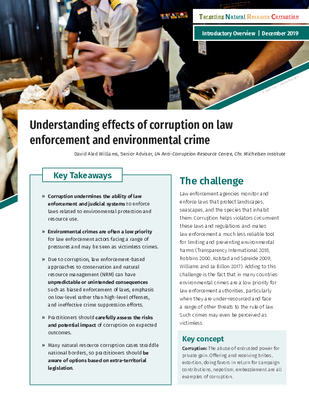Understanding effects of corruption on law enforcement and environmental crime

Law enforcement agencies monitor and enforce laws that protect landscapes, seascapes, and the species that inhabit them. In many countries environmental crimes are a low priority for law enforcement authorities, particularly when they are under-resourced and face a range of other threats to the rule of law. Corruption helps violators circumvent these laws and regulations and makes law enforcement a much less reliable tool for limiting and preventing environmental harms.
Key Takeaways:
- Corruption undermines the ability of law enforcement and judicial systems to enforce laws related to environmental protection and resource use.
- Environmental crimes are often a low priority for law enforcement actors facing a range of pressures and may be seen as victimless crimes.
- Due to corruption, law enforcement-based approaches to conservation and natural resource management (NRM) can have unpredictable or unintended consequences such as biased enforcement of laws, emphasis on low-level rather than high-level offenses, and ineffective crime suppression efforts.
- Practitioners should carefully assess the risks and potential impact of corruption on expected outcomes.
- Many natural resource corruption cases straddle national borders, so practitioners should be aware of options based on extra-territorial legislation.
Learn more on the Targeting Natural Resource Corruption knowledge hub.


